About Us
Our History
In 1998, youth advocates from California Youth Connection (CYC) recognized the need for an agency that would advocate for the voices of youth in the foster care system. As a result of that advocacy, the California Office of the Foster Care Ombudsperson (OFCO) was created. In 2001, the Foster Youth Bill of Rights was created and became one of the most important pieces of legislation for the office to oversee. In 2020, the Foster Youth Bill of Rights was updated to include over 41 foster youth rights. Today, the OFCO provides curriculum, training, and technical assistance to ensure the rights are upheld.

Our Mission
The mission of the California Office of the Foster Care Ombudsperson (OFCO) is to advocate on behalf of foster children and youth regarding their care, placement, and services. The OFCO is an autonomous entity that is empowered to investigate and informally resolve complaints impacting foster youth, increase awareness about foster youth rights, and make recommendations to help support systemic change.
In 2024, we...
answered
hotline calls
initiated
complaints
wrote
verification letters
served
foster youth
OFCO Timeline
2025 marks 25 years of the Office of the Foster Care Ombudsperson. Click on each tab to learn key events in our office’s history as we continue to promote the rights of youth in care throughout California.
The Office of the Foster Care Ombudsperson (OFCO) was created in August 2000 and is empowered to investigate the acts of state and local administrative agencies caring for youth in care, make recommendations that promote the safety and delivery of appropriate services, and to safeguard the personal rights of these youth.
OFCO was established by Senate Bill 933.
Karen Grace-Kaho was the first Ombudsperson.

The first annual report for the Office was released. In the first full year of operations- OFCO received 1,296 contacts- including 550 complaints.
AB 899 consolidates all the rights of foster children into a common location in California law. After several attempts to establish the rights of foster youth in California law, the California Youth Connection (CYC) achieved success in 2001 with the passage of Assembly Bill (AB) 899. AB 899 also mandates that social workers inform youth of their rights at least once every 6 months, and the list of these rights must be posted in facilities caring for six or more foster children.

PUB 396 Foster Youth Rights poster is released.
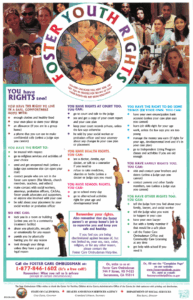
AB 408 is enacted which adds Section 362.05 to the Welfare and Institutions Code. AB 408 states all youth in care can participate in age-appropriate, extracurricular, enrichment and social activities.
OFCO served on the Permanency for Youth Project Taskforce and advisory board. The work of this taskforce inspired the creation of AB 408.
ACL 05-39 is released. This All-County Letter (ACL) highlights that foster children now have the legal right to engage in age-appropriate extracurricular and social activities, in line with California laws AB 408 and SB 358. Caregivers are required to apply a reasonable prudent parent standards (RPPS) approach when deciding if a child can participate, considering each child’s unique circumstances and ensuring no barriers prevent their involvement in these activities.
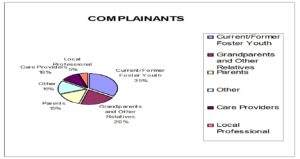
Senate Bill 1353 and Assembly Bill 1933 are passed which allow youth in care to continue attending their school of origin when placement changes occur.
AB 12 is passed. AB 12 extends foster care benefits from age 18 to age 21. Studies have shown that former foster youth are less likely to complete high school, attend college, or be employed, and are at a higher risk for becoming homeless, arrested or incarcerated. AB 12 aims to reduce this correlation by providing foster youth between the age of 18 and 21 a better support system to stay in school and obtain employment.
Sexual Orientation, Gender Identity and Expression (SOGIE) Protections are clarified in the Foster Youth Bill of Rights.
On October 11, 2015, California Governor Jerry Brown signed a landmark bill that protects transgender children in the foster care system.
Senate Bill 731 gives critical guidance to child welfare workers regarding the placement of transgender youth in out-of-home care. The bill amends the Foster Care Bill of Rights to specify that foster youth have the right to be placed according to their gender identity, regardless of the sex listed in their court or child welfare records.
AB 592 is passed and authorized the CDSS to provide former foster youth with written verification of their time spent in foster care.

Federal Legislation is signed into law and provides new federal guidelines on reasonable and prudent parent standards. (Preventing Sex Trafficking and Strengthening Families Act)
Rochelle Trochtenberg is appointed the second Foster Care Ombudsperson for the state of California. She is also the first former foster youth to serve as the ombudsperson for California.
AB 1067 provides a more comprehensive Foster Youth Bill of Rights and ensures all foster youth are informed about these rights. The bill mandates the formation of a working group tasked with recommending updates to the Foster Youth Bill of Rights that includes input from foster youth and foster parents. This group will review federal and state laws to identify the right of children in foster care, suggest necessary updates to the Foster Youth Bill of Rights, assess how foster children are informed about their rights, and propose changes to the frequency and methods of notification.

AB 2247 is enacted. This bill requires a social worker or placing agency to develop and implement a “placement preservation strategy’ to preserve a placement prior to initiating a 14 day notice to move a child.
Additionally, this bill requires the OFCO to investigate all complaints related to a lack of placement preservation efforts.
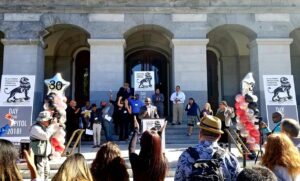
AB 175 went into effect in January 2020, expanding the Foster Youth Bill of Rights to 41 rights and clarifying the role of the OFCO to provide training and technical assistance on the rights of children and youth in foster care, reasonable and prudent parent standards, and services provided by the office. As a result, the OFCO updated the training curriculum and developed digital and printed publications in preparation for statewide in-person trainings to meet this requirement.
COVID RESPONSE: In response to the COVID- 19 Pandemic, OFCO temporarily issued Foster Youth Verification letters to all current and former foster youth to ensure timely access to communication needs. The OFCO was open seven days a week to provide youth support during the pandemic.
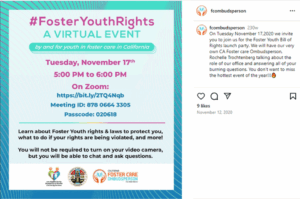
In spring of 2021, aligning closely with the priority toward expanded outreach, the office released its new website and began distribution of the new FYBoR materials, including a coloring book for foster youth ages 2-7, and an innovative trifold pocket-sized version of the FYBoR. This was the first update since 2022 and includes rights mandated in AB 175.
AB 1140 codified OFCO’s responsibility regarding children under the jurisdiction of the Office of Refugee and Resettlement who are in California Licensed Facilities. and clarified the FYBoR applied to those youth.
Larry Fluharty is appointed as the third Ombudsperson for the Office of the Foster Care Ombudsperson.
OFCO celebrates the 20th anniversary of the Foster Youth Bill of Rights (FYBoR).
AB 317 is enacted clarifying OFCO’s access to facilities, confirms the autonomy of the Office, and requires probation officers and social workers to provide the Toll-free number to the youth they oversee.
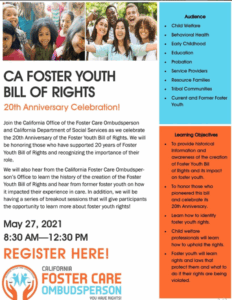
OFCO began providing monthly statewide trainings on the FYBoR and RPPS which resulted in improved outreach to over two thousand people. The virtual trainings accounted for over half of the 4,794-foster youth, non-profit staff, foster care providers and county child welfare and probation agencies trained by the OFCO.
The OFCO returned to in-person trainings and presented at workshops that included topics on the Foster Youth Bill of Rights, data of youth in care, cultural humility, and cultural competency practices while caring for youth in care. In addition, Diversity, Equity and Inclusion were included in the curriculum.
Juvenile Justice Trainings & Outreach The OFCO worked on further developing curriculum for juvenile justice trainings and outreach, updated information on foster care policies, education, sexual orientation, and basic personal rights. OFCO determined there was a need to have trainings in specific areas including, but not limited to, juvenile justice involved youth and education issues for foster youth.


OFCO created a position for a Juvenile Justice and Education Specialist to provide specialized training to child welfare professionals, probation and juvenile justice professionals, CASA’s, Tribes, advisory committees, foster youth, and justice involved youth on their rights and how to recognize cultural humility when working with young people. That position was filled in October of 2023 .
The OFCO disseminated nearly 60,000 publications throughout California.
The OFCO, in partnership with the Office of Equity (OOE) Division, began to draft an OFCO Equity Plan (EP). The EP includes internal workforce goals and impact program goals, along with plans for evaluation, and accountability measures to improve outcomes for program participants. The OFCO has identified goals focused on the following categories: training and communication, workforce, data, external partner engagement, and programmatic outcomes.

The number of Foster Youth Verification Letters issued more than doubled from 2023. This is a direct result of increased outreach performed by the office. The letters provides former foster youth with access to benefits in education, housing and more.
OFCO team members had the opportunity to network and learn best practices to better support youth at multiple conferences, including the United States Ombudsman Association (USOA) Conference, Blueprint, and Pathways to Higher Education. Our Juvenile Justice Specialist collaborated with the Office of Youth and Community Restoration (OYCR) to co-present at the USOA Conference.


2025 goals
- The OFCO is preparing for the 25th anniversary of the release of the Foster Youth Bill of Rights.
- Improve access for youth- increase contacts from youth by 2% from 2024.
- Establish and create quarterly reports to summarize data collected through our continued contact with foster youth, child welfare professionals and their community supports.
- Continue to promote and advocate for foster youth, including those impacted by the justice system through outreach, trainings, education, and awareness.
To ensure equal access to all of constituents, our Foster Youth Verification Letter template has been modified. The letters will now include a digital signature and are accessible in accordance with Section 508 of the US Rehabilitation Act.
The OFCO is currently working on updating the FYBoR publications to include updated laws and improve language access.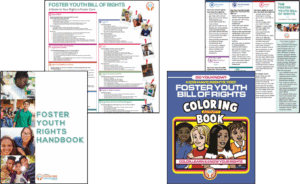
The California Office of the Foster Care Ombudsperson is dedicated to serving
foster youth in California by investigating and resolving complaints
about foster youth rights, care, placement, and services.
![]() 1-877-846-1602
1-877-846-1602
The law that governs the OFCO is Welfare and Institutions Code (WIC) 16164.



